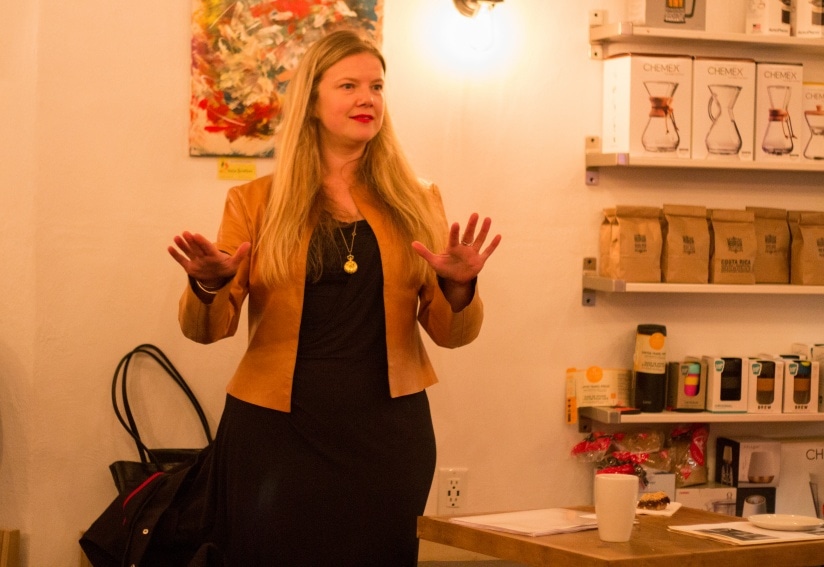
KJIPUKTUK (Halifax) – At The Nook on Gottingen Street, Martha Paynter begins her talk on the right to healthcare for female prisoners by mentioning two women who died while in Truro’s Nova Institution for Women in 2015: Veronica Park and Camille Strickland-Murphy.
“I’d like to honour these women and their lives and their deaths with this talk,” says Paynter, who is a Registered Nurse practitioner and a Doctoral Candidate at Dalhousie School of Nursing.
The families of the two women filed wrongful death lawsuits against the Correctional Service of Canada (CSC), alleging that the CSC did not administer proper health care treatment to either, and that prison staff failed to recognize and treat both of their mental illnesses.
Park died of pneumonia, which prison nurses failed to notice in time, despite her having visited the medical clinic more than seven times during the weeks before her death. Strickland-Murphy died by suicide, after being attacked twice by a fellow prisoner, sustaining serious head injuries that the family allege were not properly treated, and after several attempts at harming herself, which the family was never informed of until after her death.
“I think when we talk about women’s health we sometimes forget that the absence of health, is death, and this is what happens when we inadequately care for people inside,” Paynter says.
Paynter is the founder and coordinator of Women’s Wellness Within, a non-profit supporting criminalized women who are in the Nova Institution for Women in Truro, the Central Nova Scotia Correctional Facility in Dartmouth (also known as the Burnside jail), the Youth Facility in Waterville, and women who are on bail or parole in the community.
“Among prisoners, it’s not just this history of trauma and mental illness and substance abuse, as if those weren’t enough. 16% of prisoners have asthma, 16% have hypertension, 19% have Hepatitis C, 8% have diabetes, 26% have chronic back pain and 68% are classified as obese. So it’s not just mental health but it’s the overlapping of all these physical illnesses as well,” she says.
Too many women needlessly incarcerated
Paynter singles out the high rates of prisoners who are in remand, meaning they have not been found guilty, but are forced to await trial at the jail. Astonishingly, up to 80% of prisoners in Nova Scotia are in remand at any one time, and remand time can be anywhere from three days to three years.
“In Nova Scotia, we have one of the highest rates of remand not only in Canada but in the world,” Paynter says, noting that this has negative effects on women, as women tend to be the sole providers especially those who are are pregnant or have young children.
“One of the things I’ve looked at is how some countries have come up with policies and legislation so that pregnant people and mothers of children under the age of 12 are never remanded, because it is so disruptive, and the chances of it serving the greater good are so slim, because most women are incarcerated for non-violent crimes related to economic survival,” she says.
Paynter explains that though crime rates in Canada have been on a steady decline for decades, women’s incarceration has been steadily increasing, and that women are the fastest growing population in prisons.
One contributing factor to the rising rate of incarcerated women in Nova Scotia in particular has to do with the province’s pro-arrest policy, Paynter explains. According to this policy, when a call is made to police regarding a domestic abuse situation, it is mandatory that an arrest be made.
“Historically, there was a lack of willingness for women to press charges against abusive men,” says Paynter. “The idea was, abusers wouldn’t keep getting away with it, this would be a way to support women. It just didn’t work out that way,” she says.
This policy ends up backfiring on the victims of abuse, and Paynter says in a lot of cases, it is the women who end up being taken into custody.
“It simply doesn’t work for women to have this policy of pro-arrest,” rather than working on rehabilitation or alternatives, she says.
Only very limited access to health care
Paynter also describes how health care offered to women in these facilities is very limited, especially when compared with the health care men receive.
“There’s also a lot of evidence about how women who are inside are a very different population, and how that difference rather than being smothered or neutralized, isn’t adequately conceptualized or considered,” she says.
For example, there aren’t enough health professionals with prescribing authority, making it very difficult to access the medication women require, and the same goes for routine medical procedures such as pap tests.
“People want a pap test, they kind of want it as health promotion. They know that they should do that and they want to do that to take care of themselves, it’s a little bit of self-care that they would like to actualize, but that’s usually not available,” Paynter says.
Another huge access-related issue is the Nova Scotia Health Authority’s policy that anyone in jail—including those on remand—are denied treatment for Hepatitis C, a fatal infectious disease that is incredibly common among this population in particular.
One woman present at the meeting, who has previously been incarcerated, said that she witnessed women engaging in behaviours which would lead to contracting Hep C, such as sharing razors, due to the lack of adequate hygiene supplies.
Paynter goes on to say that at the federal level, 27% of prisoners had engaged in tattooing, 24% had unprotected sex, 19% engaged in injection drug use and 9% in slashing and self-injury; all of which increases the risk of contracting and spreading Hep C (as well as HIV).
“So you and I can get (curative treatment), but people who are at the greatest risk in this violent environment, where there is limited access to hygiene products, are denied that access by policy,” Paynter says.
“There could be a legal remedy to this discrimination, but prisoners don’t have a ton of cash to sue the government. And this is one of the issues—there’s a lack of resources for this population to fight for what is definitely on paper a fundamental right, a right on many levels.”
Solitary confinement
One other point of discussion Paynter brings up is the health implications of solitary confinement.
Newly proposed federal legislation would mandate a maximum of 20 hours a day of isolation, compared to the current cap of 22 hours per day. The legislation only applies to federal prisons.
However as Paynter notes, there are international conventions against solitary confinement of anyone with a mental or physical disability, and there are several international statutes that prohibit the solitary confinement of pregnant women and of youth.
“Those ones are pretty obvious, but we still do it. We had a client at Burnside who was in solitary confinement for over a week while pregnant.”
That woman’s charges ended up being dropped, but her baby did not make it.
“When we remand people we cause harm. That’s just pure and simple,” Paynter says.
See also: Let’s talk – Bell Canada makes calling from prisons needlessly difficult for women in prison
With a special thanks to our generous donors who make publication of the Nova Scotia Advocate possible.
Subscribe to the Nova Scotia Advocate weekly digest and never miss an article again.



